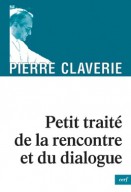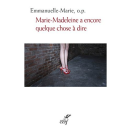Là où se posent les vraies questions
Collection Intimité du christianisme
784 pages - avril 2012
22,00€
En 1975, au moment où commence ce troisième volume de la correspondance familiale de Pierre Claverie, la situation de l'Église en Algérie semble hypothéquée. Notre-Dame d'Afrique à Alger, la basilique Saint-Augustin à Hippone, et la basilique de Santa-Cruz à Oran ont été occupées. Bientôt, seront posés des scellés sur la bibliothèque des Glycines, ce centre que dirige Pierre Claverie et où les Algériens n'auront plus le droit de suivre des cours d'arabe. La « Revue de Presse », revue dite « subversive », sera interdite... Mais à côté de ces défis posés à l'Église par une certaine Algérie politique et administrative et par une société en lutte avec ses propres contradictions, il y a aussi beaucoup de soutien de la part des Algériens eux-mêmes. Pour Pierre Claverie, qui analyse et décrit les transformations à l'œuvre dans la société algérienne et dans la communauté chrétienne, l'idée de vivre, de travailler, et de contribuer au développement d'une société qui se cherche est très attrayante. C'est pourquoi, au centre de ce troisième volume se pose la question du destin de Pierre Claverie. Où est sa place ? Va-t-il pouvoir rester en Algérie comme il le désire ? Vu de l'extérieur, notamment des milieux religieux de Rome, du Caire et de Paris, ce pays ne semble pas peser bien lourd dans la balance : il semble donc évident que Pierre Claverie quittera l'Algérie, appelé par son Ordre, pour apporter son aide au couvent du Caire, associé à l'Institut dominicain d'études arabes (IDEO) ou élu, en France, comme prieur provincial des dominicains. Pierre lutte contre ces tentations et tentatives de l'envoyer ailleurs. Il aime cette Algérie si différente de celle de son enfance. Il entend se donner à elle.
--
In 1975, when this third volume of Pierre Claverie’s family correspondence begins, the situation of the Church in Algeria seems unsure. Notre-Dame d'Afrique in Algiers, the Saint-Augustin basilica in Hippone, and Santa-Cruz in Oran have been occupied. Soon they will close the Glycines library, a centre run by Pierre Claverie where Algerians will no longer be able to learn Arabic. The ‘Revue de Presse’, described as ‘subversive’, will be outlawed... But apart from these threats to the Church by a certain political and administrative class in Algeria, and by a society wrestling with its own contradictions, there is a great deal of support from Algerians themselves. For Pierre Claverie, who analyses and describes the on-going transformations in Algerian society and in the Christian community, the idea of living, working and contributing to the development of a society in search of itself is very appealing indeed. That is why, at the heart of this third volume, the question of Pierre Claverie’s destiny is posed: What is his place? Will he be able to stay in Algeria, as he would like to? Looking from the outside, especially from the religious milieu in Rome, Cairo and Paris, this country does not weigh heavily in the balance of things: it seems obvious that Pierre Claverie should leave Algeria, be called back by his Order to give his assistance to the convent in Cairo, associated to the Institut dominicain d'études arabes (IDEO), or elected as provincial prior of the Dominicans in France. Pierre struggles against temptations and these attempts to send him away. He loves this Algeria, so different from that of his childhood. He means to give his life for it.
--
In 1975, when this third volume of Pierre Claverie’s family correspondence begins, the situation of the Church in Algeria seems unsure. Notre-Dame d'Afrique in Algiers, the Saint-Augustin basilica in Hippone, and Santa-Cruz in Oran have been occupied. Soon they will close the Glycines library, a centre run by Pierre Claverie where Algerians will no longer be able to learn Arabic. The ‘Revue de Presse’, described as ‘subversive’, will be outlawed... But apart from these threats to the Church by a certain political and administrative class in Algeria, and by a society wrestling with its own contradictions, there is a great deal of support from Algerians themselves. For Pierre Claverie, who analyses and describes the on-going transformations in Algerian society and in the Christian community, the idea of living, working and contributing to the development of a society in search of itself is very appealing indeed. That is why, at the heart of this third volume, the question of Pierre Claverie’s destiny is posed: What is his place? Will he be able to stay in Algeria, as he would like to? Looking from the outside, especially from the religious milieu in Rome, Cairo and Paris, this country does not weigh heavily in the balance of things: it seems obvious that Pierre Claverie should leave Algeria, be called back by his Order to give his assistance to the convent in Cairo, associated to the Institut dominicain d'études arabes (IDEO), or elected as provincial prior of the Dominicans in France. Pierre struggles against temptations and these attempts to send him away. He loves this Algeria, so different from that of his childhood. He means to give his life for it.
- Dimensions : 145x210x40
- ISBN : 9782204094627
- Poids : 980 grammes
Avec la collaboration de : Anne-Catherine Meyer, Éric Gustavson, Jean-Jacques Pérennès
DU MÊME AUTEUR
> VOIR TOUS LES LIVRES DE l'AUTEUR











